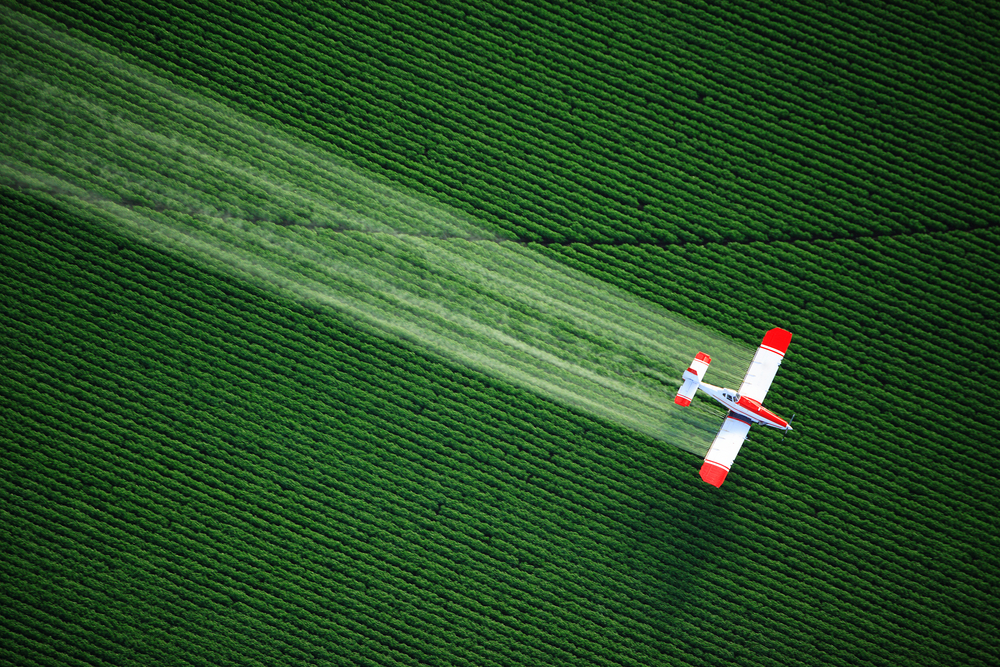The Israeli army is continuing to spray dangerous herbicides on agricultural fields inside the Gaza Strip, three years since +972 Magazine first reported on the practice. This week, three Palestinian and Israeli human rights groups sent a letter to Israeli military officials demanding they immediately cease spraying the dangerous chemicals into Gaza.
The latest instance of spraying herbicides, using a reportedly carcinogenic chemical, took place in early December. A variety of crops inside Gaza were damaged as a result, according to the rights groups.
“The farmers have sustained massive losses in the past as a result of spraying, and been exposed to the health risks associated with the chemical agents used in the spraying,” Al Mezan, Gisha, and Adalah wrote in their letter to Israeli Defense Minister Benjamin Netanyahu, along with the country’s attorney general and military advocate general.
“The spraying is a highly destructive measure, infringing on fundamental human rights and violating both Israeli and international law,” the rights groups added in a joint statement Wednesday.
Israel has for years maintained a unilateral “no-go zone” inside the Gaza Strip, and regularly sends bulldozers and other equipment across the fence to level land and destroy plants and trees in order to maintain a clear line of sight. Since the start of 2015, the Israeli army crossed the fence upwards of 207 times in such operations, an average of more than twice a week.
In December 2015, the Israeli army admitted for the first time, in response to questions from +972 Magazine, that it was also using herbicides inside Gaza. According to follow-up reporting by Amira Hass in Haaretz, close to 3,500 acres (14,000 dunams) of farmland in Gaza have been damaged by the practice. The spraying has also damaged Israeli crops along the fence.
The letter from the three human rights groups further reveals that the chemical being sprayed by Israeli military contractors, Roundup, has been determined by the World Health Organization to be a carcinogen and is not meant for aerial spraying, both due to the health risks and also the risk posed to nearby crops.
In 2016, the farmers demanded the army compensate them for the damage. The army refused.
Despite the IDF’s confirmation to +972, and later to Gisha, that it had sprayed herbicides inside the Gaza Strip, the Israeli Defense Ministry claimed in court filings that the planes only flew over Israeli territory. Gaza farmers have said, however, that the planes do, indeed, fly inside Gaza’s airspace.
Furthermore, based on documents obtained by the rights groups through a freedom of information request, the spraying is deliberately conducted when the wind would carry the chemicals further into Gaza and not toward Israeli fields.
During the Vietnam war, the United States famously sprayed Agent Orange, napalm and other herbicides and defoliants to destroy vast swathes of jungle in Vietnam for military purposes. After the health and environmental effects of such practices became clearer, however, the international community initiated the Environmental Modification Convention restricting the use of herbicidal warfare, which came into force in 1978. Israel is not a party to the convention.
Michael Schaeffer Omer-Man is the editor-in-chief of +972 Magazine and a regular contributor of both reporting and analysis. Prior to joining +972 he worked as the news desk manager for JPost.com. Reprinted, with permission, from +972 Magazine.






Soooo — What is new? The Ziomonster is a serial violator of any international law that doesn’t allow it to practice its homicidal urges on the hapless Palestinian people. Will Europe or the UN the Arab League take any verbal or punitive action to end this administration of poison? No.
The chemical concerned is glyphosate, created by the US company Monsanto to replace the highly poisonous “Agent Orange” used in Vietnam by US forces. Glyphosate is used world-wide in huge quantities because of its effectiveness and also because of its safety. The chemical kills plants by blocking an enzyme pathway that exists only in the plant kingdom: it cannot harm animal life.
It is necessary to distinguish between the glyphosate chemical itself, and glyphosate weed-killer, in which the chemical is dissolved in powerful surfactants. These are definitely harmful to life: get them in your stomach, lungs or eyes and you will be in big trouble. Here in Spain you cannot buy the weed-killer unless you have passed a course in safe usage. We wear protective clothing, goggles and breathing masks, and always spray downwards onto the leaves of the weeds.
The question of cancer arose in an epidemiological survey of retired farmers, which showed that those who had used glyphosate had an increased incidence of the blood cancer non-Hodgkins-lymphoma. It is on the basis of this type of study that the WHO decided that the glyphosate weed-killer probably contains a carcinogen. As far as I know, no causal link has been established, nor has it been determined whether the carcinogen is in the chemical or in the surfactants. The farmers in the study mentioned above were using glyphosate weed-killer in its early days, believed it to be harmless, and took no precautions against ingestion.
In recent years, a new practice has developed in which farmers not only spray the weeds around the food crop, but also spray the food crop itself to kill it when it is ready for harvest. This must be the reason for aerial spraying. The explanation given is that the crop is easier to harvest once the foliage has died back, but it does mean that glyphosate, and any carcinogens it may contain, is getting into our foods.
I doubt that the Israelis are spraying the Palestinian’s food crops to help them with their harvest. The only motive I can think of is genocidal.
My thanks to lobelog for the great article and to @Dgfincham for the useful information in his comment.